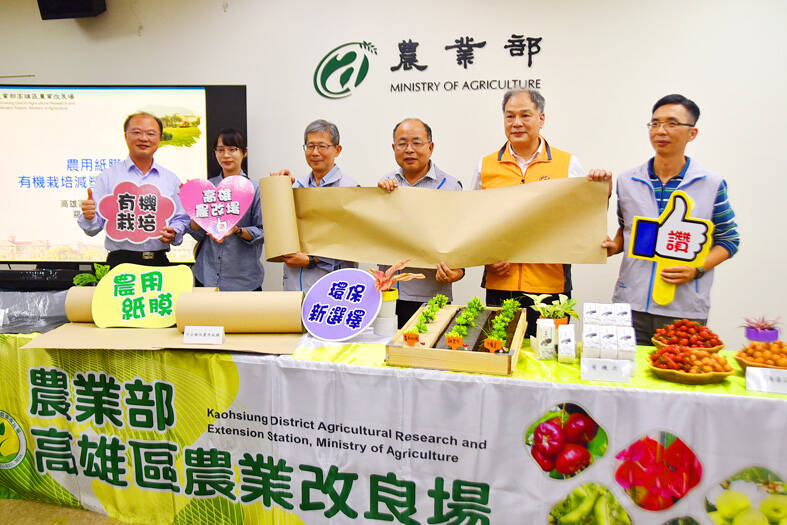The Kaohsiung District Agricultural Research and Extension Station has developed low-cost paper agricultural film to reduce plastic use in organic farming to meet the nation’s net zero and sustainability goals.
Local organic farmers mainly use manual labor or plastic film covers to control the growth of weeds, but an alternative is needed in light of a labor shortage and plastic pollution, the station said in a news release on Tuesday.
BIODEGRADABLE

Photo: Wu Po-hsuan, Taipei Times
Paper films developed by the station are made from regenerated vegetable fiber and are biodegradable, it said.
To increase organic rice production, farmers pull out the weeds while covering soil surfaces with plastic film to inhibit their growth, station Director Lo Cheng-tsung (羅正宗) said.
However, plastic films are a source of environmental pollution, as they could easily break and the waste they leave behind is difficult to clean up, he said.
Weed control is critical to organic rice cultivation, but manual weeding has become challenging due to a shortage of workers, Lo said.
The station began to use paper film to cover organic rice fields in 2023, he said, showing a photograph in which rice farms covered with paper film had fewer weeds than those that were not.
The experiment showed that paper film can reduce weed coverage by 24 percent and double production volume, Lo added.
CUCUMBERS
Another experiment on cucumbers grown in a greenhouse showed that paper film can significantly inhibit weeds and remain intact after five months of use in a greenhouse, he said, adding that its production volume was equivalent with that of organic fruits or vegetables cultivated in greenhouses using plastic film.
The experiments show that paper films can inhibit weed growth and retain moisture in the soil under lower temperatures, not only reducing plastic pollution, but also producing a healthy volume of quality organic crops, he said.
Given that paper agricultural films have become a global trend and are widely used in other countries such as Japan, they have been registered as an applicable material for organic farming in Taiwan, he said.
Using paper films made in Taiwan would cost about NT$30,000 per hectare compared with NT$32,000 to NT$36,000 to hire workers to perform manual weeding, he said.
ADVANCEMENTS
That means the application of paper films is highly feasible, and technological advancements and its increasing popularity would further reduce costs, Lo said.
The station will continue to develop and test different materials of paper film, with the goal of increasing their durability and adaptability to various cultivation environments, he said.

Taiwan is stepping up plans to create self-sufficient supply chains for combat drones and increase foreign orders from the US to counter China’s numerical superiority, a defense official said on Saturday. Commenting on condition of anonymity, the official said the nation’s armed forces are in agreement with US Admiral Samuel Paparo’s assessment that Taiwan’s military must be prepared to turn the nation’s waters into a “hellscape” for the Chinese People’s Liberation Army (PLA). Paparo, the commander of the US Indo-Pacific Command, reiterated the concept during a Congressional hearing in Washington on Wednesday. He first coined the term in a security conference last

Prosecutors today declined to say who was questioned regarding alleged forgery on petitions to recall Democratic Progressive Party (DPP) legislators, after Chinese-language media earlier reported that members of the Chinese Nationalist Party (KMT) Youth League were brought in for questioning. The Ministry of Justice Investigation Bureau confirmed that two people had been questioned, but did not disclose any further information about the ongoing investigation. KMT Youth League members Lee Hsiao-liang (李孝亮) and Liu Szu-yin (劉思吟) — who are leading the effort to recall DPP caucus chief executive Rosalia Wu (吳思瑤) and Legislator Wu Pei-yi (吳沛憶) — both posted on Facebook saying: “I

The Ministry of Economic Affairs has fined Taobao NT$1.2 million (US$36,912) for advertisements that exceed its approved business scope, requiring the Chinese e-commerce platform to make corrections in the first half of this year or its license may be revoked. Lawmakers have called for stricter enforcement of Chinese e-commerce platforms and measures to prevent China from laundering its goods through Taiwan in response to US President Donald Trump’s heavy tariffs on China. The Legislative Yuan’s Finance Committee met today to discuss policies to prevent China from dumping goods in Taiwan, inviting government agencies to report. Democratic Progressive Party Legislator Kuo Kuo-wen (郭國文) said

The Ministry of Economic Affairs has fined Taobao NT$1.2 million (US$36,900) for advertisements that exceeded its approved business scope and ordered the Chinese e-commerce platform to make corrections in the first half of this year or its license would be revoked. Lawmakers have called for stricter supervision of Chinese e-commerce platforms and more stringent measures to prevent China from laundering its goods through Taiwan as US President Donald Trump’s administration cracks down on origin laundering. The legislature’s Finance Committee yesterday met to discuss policies to prevent China from dumping goods in Taiwan, inviting government agencies to report on the matter. Democratic Progressive Party